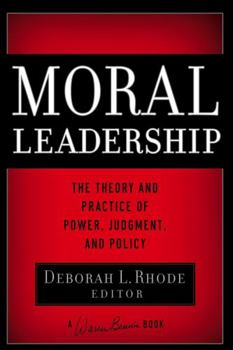Moral Leadership: The Theory and Practice of Power, Judgment and Policy
Select Format
Select Condition 
Book Overview
Moral Leadership brings together in one comprehensive volume essays from leading scholars in law, leadership, psychology, political science, and ethics to provide practical, theoretical policy... This description may be from another edition of this product.
Format:Hardcover
Language:English
ISBN:0787982822
ISBN13:9780787982829
Release Date:June 2006
Publisher:Jossey-Bass
Length:400 Pages
Weight:1.75 lbs.
Dimensions:1.3" x 6.2" x 9.1"
Customer Reviews
1 rating
Relevant, Current and A Fresh Pespective on Moral Leadership
Published by Thriftbooks.com User , 14 years ago
In this timely anthology of piercing thought on ethical leadership, Rhode issues the call for developing ethical cultures in businesses and organizations in the midst of moral meltdowns. This collection of thirteen scholarly works paints the picture of increasing competing values in society today and lays out the responses needed. The book is divided into five parts: discussing ethical judgment, the psychology of power, self-sacrifice and self-interest, serving the public through the public sector of nonprofits, and perspectives and implications of moral leadership. In the introduction, Rhode builds a historical backdrop for ethical leadership from the 1960s to today (10). This historical perspective establishes the moral landscape of the present. She surveys today's moral environment through the lenses of moral norms, compliance acts, and literature. Specifically, moral behavior of leadership is the focal point of the book. Personal moral accountability goes to the heart of moral decision-making. "Diffusion of responsibility, socialization to expedient norms, and peer pressure" are mechanisms that guard leaders' consciences (27). Rhode calls for the integration of ethics in business and organizations through social and educational strategies. The leadership must be committed to a sustainable ethical culture in which moral strategies are implemented within strategic planning, day-to-day operations, resource procurement and allocation, human resources, communications, auditing, and the larger community of stakeholders (37). Changing the moral behavior of leaders reflects a lifestyle change that cultivates an ethical culture throughout the organization. Part One: Ethical Judgment The "Perp Walk" has become the familiar phrase of corporate leaders who have learned of moral meltdowns. David Luban does not see these "Perps" as rotten apples among the barrel of sweet apples. He says that they are like everyone else practicing an everyday morality of unsettled principles in a competitive and adversarial environment where the discipline of reinforced values wanes. Luban captures the concept with the term "adversarial ethics" that sets the stage for highly competitive people, winners over losers, and cognitive dissonance to be justified with "any eye for an eye" or on the basis of fairness. Most people believe that they are doing the right thing. The problem is that what we may believe is right might not be ethical. George Costanza, in a Seinfeld episode, said, "Jerry, just remember, it's not a lie if you believe it." This is Luban's point - self-deception leads us down the path of self-justification; however, he seems to place individual moral decision making higher than group moral decisions. He backs up his hypothesis with examples of the Stanly Milgram Project and the Stanford Prison Experiment where organizational roles powerfully influence a person's conscience. The Stanford Prison Experiment consisted of a mock prison with




